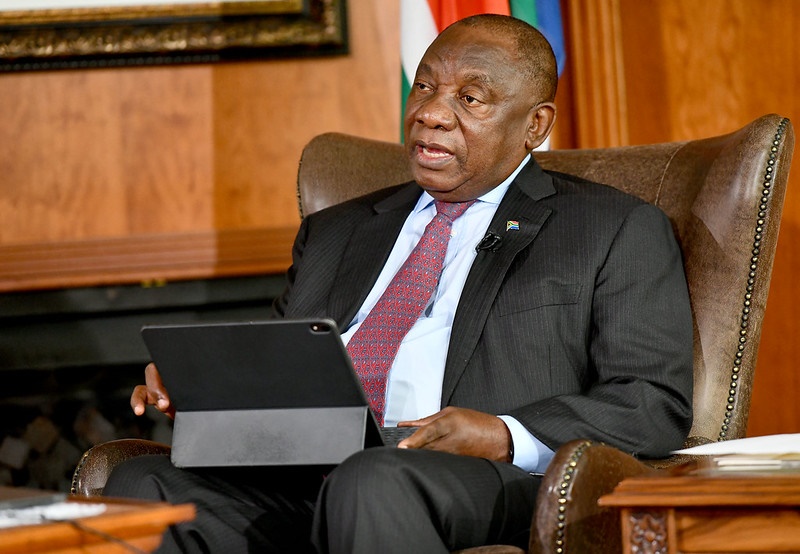
President Ramaphosa’s leadership in this crisis has been exemplary, but the real test is whether we can overcome the financial crisis, writes Hlengani Mathebula
Since taking the highest political office in the land, President Cyril Ramaphosa’s consultative approach to leadership was increasingly being seen as a liability by some, especially as the country’s economy continued to stagnate.
Ramaphosa was described as a leader who prized consultation above speedy public policy interventions to fix the economy and get it back on to a higher growth path.
But since the Covid-19 coronavirus pandemic hit South Africa, Ramaphosa’s leadership has been found to be exactly the tonic for the type of existential crisis the country faces.
US political scientist and Harvard University Professor Joseph Samuel Nye makes the point about former UK prime minister Winston Churchill – the man didn’t change, the context did.
Nye says that, had Adolf Hitler not kicked off events that eventually sucked the whole world into World War 2, Churchill would have been a minor figure in history. Hitler made Churchill the man who fit the moment.
Of course, Ramaphosa entered this crisis in a different position to Churchill’s, yet the criticism of his leadership style was growing louder even among those who had seen him as a political saviour in the run-up to the ANC elective conference at Nasrec in 2017.
Indeed, even at the start of the current crisis triggered by Covid-19, Ramaphosa’s consultative approach angered some.
He would promise to brief the nation at a particular time, but then run late because he was still consulting.
In time, however, the nation warmed to his approach, helped no doubt by the adjustments in his communication of briefing times.
As Nye says, a consultative style is costly in terms of time, but creates a buy-in and can empower the followers.
The nation has by and large bought into Ramaphosa’s tough measures aimed at slowing down the spread of the virus.
However, the goodwill that Ramaphosa’s approach has generated has been eroded by the behaviour of some of his Cabinet colleagues.
Some ministers have failed to master one basic fact about government – it may produce lots of paper, but its core communication function remains an oral culture. It’s what leaders say, and what citizens hear, that matters.
It is also Ramaphosa’s consultative approach that has helped government put together a package of measures aimed at supporting the economy through the pandemic.
The R800 billion package compares favourably with what other countries have put forward to aid companies and households during this difficult time.
These measures must also be seen in the context of a country that went into this crisis with its finances already strained.
Seen through that prism, government has done well to put together a package of this magnitude.
Government has allocated R500 billion in support, on top of measures laid out by the SA Reserve Bank, which add another R300 billion.
Included is the support the SA Revenue Service (Sars) has put in, which essentially enables companies to delay tax payments so they can have hold on to their cash flows so they can sustain their businesses.
The total package adds up to 16% of the country’s economic output as measured by GDP.
In short, the measures are meant to achieve three broad objectives: ensure that companies remain liquid; that firms are able to pay salaries and keep jobs; and to provide income and other support (including food parcels) to the most vulnerable citizens and the unemployed.
Read: Ramaphosa levels with SA on plans to reopen the economy
However, like any public policy, the success of these measures will depend on the capability of the state and the generosity of the private sector – including commercial banks.
In other words, whether money gets to its intended beneficiaries will depend on the effectiveness and efficiency of the women and men employed by government and its entities.
The success of the relief scheme backed by the Unemployment Insurance Fund (UIF) depends on employers applying for support. The scheme is meant to help employers pay their workers who cannot work because of the national lockdown.
By last Sunday, the fund had paid R3 billion to 59 161 employers, who in turn were meant to transfer the payments to 862 550 workers.
But one should bear in mind that the UIF has 1.8 million companies on its database that employ more than 8 million workers.
Even if one adjusts the number of firms that have been paid by the scheme as not all employers would require assistance, the payments to date look low.
One assumes government chose to make the UIF scheme accessible through the employers as this would reduce the volume of applications compared to if each worker applied.
However, the weakness of this approach is that it leaves workers at the mercy of employers.
If the employer doesn’t apply for the benefit, the workers have no recourse. In addition, even if an employer does apply and receives the payment from the UIF, there is no guarantee the employer will transfer the full payment to the employees.
The measures driven by Sars should present no problem as the institution’s capabilities are well known.
Equally so, the distribution of additional social grant payments through the SA Social Security Agency should by and large run smoothly.
It’s no secret that the social grants systems has ghosts – people receiving payments fraudulently – but the number of these pales into insignificance when viewed against the number of deserving recipients.
The success of the measures driven by the Reserve Bank, on the other hand, will depend on the generosity of the country’s commercial banks, as will the R200 billion loan guarantee scheme backed by National Treasury.
Over and above the two percentage point cuts in short-term interest rates, the Reserve Bank added measures aimed at easing the functioning of money markets, which are at the core of a country’s financial system.
For one, they enable the smooth functioning of the banking system. Banks, for example, borrow short (the money they take in as deposits from you and me, as well as excess funds they take from firms) and lend this money long (to you and me so that we can buy a house, a car, finance a business or build a factory or an office block).
It is therefore in the nature of the banking system – borrowing short and lending long – that banks will always have a gap in their finances that they need to plug.
They therefore need a well functioning money market where lenders and borrowers meet.
A strain, or a disruption, in the money markets would, if not addressed immediately, lead to a freezing of the entire economy.
Banks would not be able to carry out their functions, leading to companies and households not being able to make and receive payments or borrow money they need to keep themselves afloat.
Nor would savers be able to access their savings, which would add further financial strain during this difficult period.
Read: What you need to know about SA’s R500bn Covid-19 support package
That’s why the Reserve Bank stepped in quickly and decisively the moment it saw signs of strain in the markets.
The loan guarantee scheme comes in two tranches. The first, worth R100 billion, is targeted at businesses with an annual turnover of less than R300 million.
It guarantees new loans to the businesses that are in good standing. The guarantee scheme is for loans that will cover up to three months of each business’ operational expenses.
Banks are not obliged to extend Covid-19 loans covered by this scheme. Those that do will do so in terms of their normal credit and evaluation criteria.
In addition, business owners seeking access to these loans may be required to sign surety for the loan. In short, the guarantee scheme is at the mercy or generosity of the commercial banks.
Given this level of dependency on the private sector and civil servants, Ramaphosa’s immediate task is to persuade both that the future of South Africa, indeed, theirs too, rests on their shoulders.
Without necessarily throwing caution to the wind, banks will have to step out a little bit more than they usually do to provide loans to businesses.
Civil servants, on the other hand, will also have to stretch out to ensure the social and economic support measures they are entrusted with reach those they are targeted to reach.
South Africa’s sustained effort in fighting the Covid-19 pandemic, as well as the recovery of the economy, depend on the successful implementation of these support measures.
Mathebula is the managing partner and senior adviser at Cornerstone Capital partners. He writes in his personal capacity.
 | ||||||||||||||||||||||||||
Get in touchCity Press | ||||||||||||||||||||||||||
| ||||||||||||||||||||||||||
| Rise above the clutter | Choose your news | City Press in your inbox | ||||||||||||||||||||||||||
| City Press is an agenda-setting South African news brand that publishes across platforms. Its flagship print edition is distributed on a Sunday. |




 Publications
Publications
 Partners
Partners








